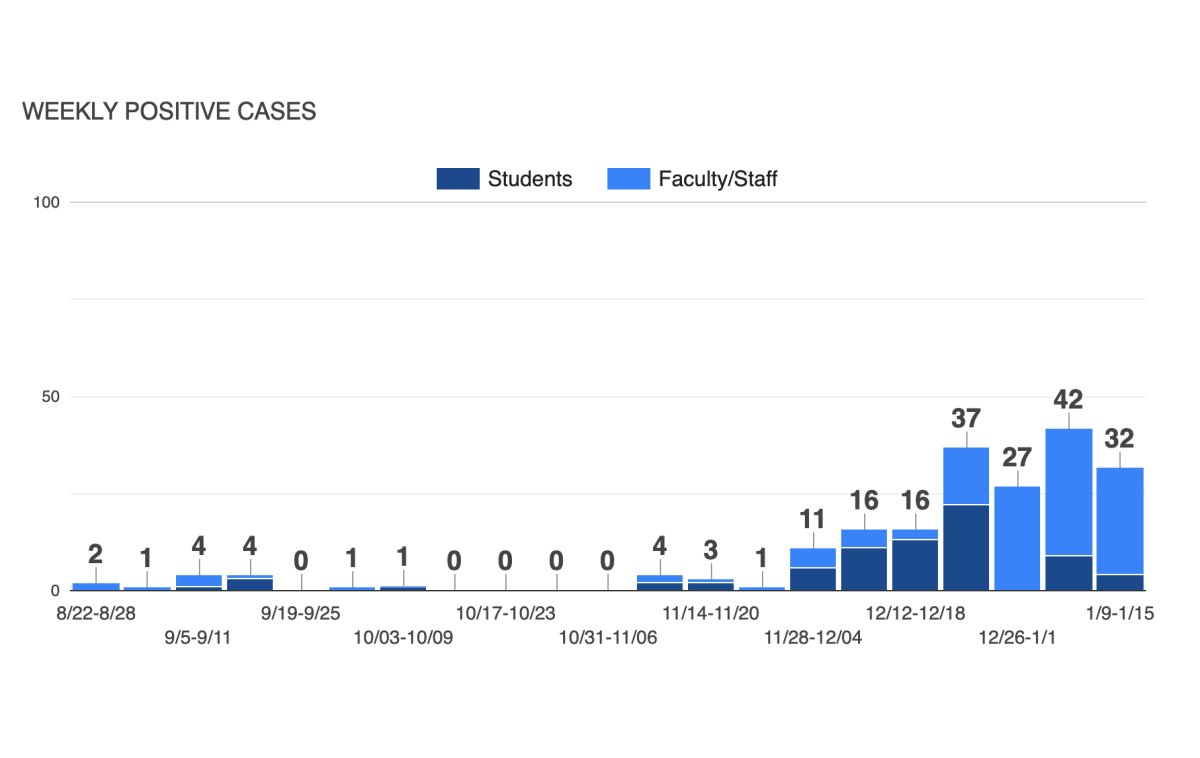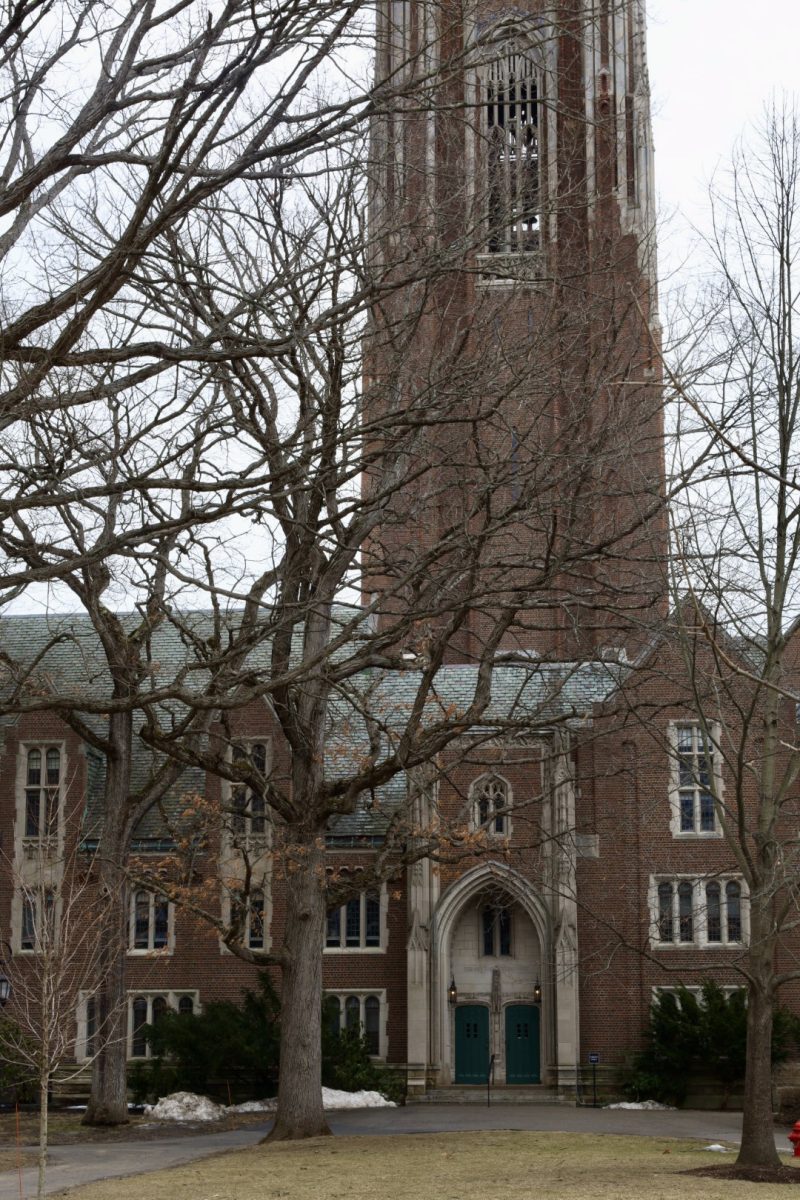For Wallis* ’24, quarantining for two weeks in Dower felt like living in a dystopian novel. In the span of a day, they were forced to make “the walk of shame” from their cozy Tower Court complex double to “fend for [themselves] in the woods.”
Wallis was not alone in this experience. When they first arrived at Dower during the week first week of December, they were greeted by five or six other residents. By the time they left, around Dec. 20, Dower had approximately 13 residents. According to Wallis, every student was vaccinated and at least one had their booster shot.
Wallis was quarantined during the College’s highest case count to date. After a total of nine student cases between Aug. 22 and Nov. 27, there were 52 student cases between Nov. 28 to Dec. 25; the total number for faculty and staff stood at 28 through this period. The uptick in cases has been attributed by administration to Thanksgiving travel as students were allowed to leave Massachusetts during the break.
After returning from Thanksgiving, one of Wallis’ blockmates tested positive. As a close contact, Wallis spent the next five days isolating and getting tested. After the five day period, Wallis said that Health Services told them they were free to return to their regular activities, since they had not yet tested positive. The next day, Wallis began experiencing symptoms. The day after that, they tested positive for COVID-19.
“There’s this shame to it,” Wallis said. “You feel like you’re about to be stoned. It’s a really weird experience.”
Contact tracing identified eight close contacts that Wallis may have exposed to COVID-19. Wallis thinks that number was likely higher, but said they were told by Health Services not to contact people who had not been identified by the official tracers as close contacts.
“It’s also worrying because the [College] has been really hard about giving [students] tests,” Wallis said. “People who I ended up giving it to wanted to get rapid tests, but the school didn’t give it to them, and they ended up testing positive in the pool.”
Isabel Flessas ’24, a student worker at the College Club testing center, described that the atmosphere at the center shifted soon after Thanksgiving.
“Before, it was kind of like ‘good job getting tested,’ you’re going to be negative, it’s going to be fine,” she said. “But now, it’s much more tense — the employees kind of seem a little more tense — just because so many people are testing positive.”
Winnie* ’24 had a similar COVID-19 experience to Wallis. After her roommate tested positive, and she had also begun experiencing symptoms, she became increasingly worried that she had COVID-19. She initially tested negative on a rapid test the day her roommate was confirmed to be positive, but tested positive the next day.
“I completely freaked out,” Winnie said. “I was like, there’s no way that I’m not testing positive. According to the school [after the negative rapid test], I was fine to do everything and go to class, but it was such a moral dilemma … it felt completely wrong.”
Both Wallis and Winnie recounted similar difficulties and highlights of quarantining in Dower. When they were both there, Health Services said that it was okay for students in Dower to hang out with one another unmasked. Both Wallis and Winnie took this as an opportunity to bond with the other students quarantining by eating meals together and even planned a birthday party.
“We [were] trying really hard to make a community,” Wallis said.
However, the quarantining period was not without its difficulties. Both Wallis and Winnie struggled to keep up with their classes due to the lack of a remote option. Additionally, COVID-19 symptoms made it difficult for them to concentrate.
“It’s so hard to get work done in this building,” Winnie said. “When classes were happening, I could not focus on anything that was school related. It took an entire day to finish an assignment that would usually take a few hours.”
Winnie also mentioned that planning to leave campus at the end of the semester had been difficult. Health Services changed her quarantine end date, which made it difficult for students to figure out when they could leave. Additionally, since Winnie was planning to travel internationally, she struggled to get all the requirements that would allow her to do so while she was quarantining.
Both students also found communication from Health Services and the school to be inconsistent. According to Wallis, every student was supposed to receive a daily call from Health Services to monitor their symptoms, but Wallis’ contact with Health Services was inconsistent. Additionally, Wallis found that when they first moved in, unless they reached out directly to Director of Residential Life and Housing Helen Wang, it was difficult to get anything they needed.
“She’s definitely doing her best to make sure we’re well taken care of,” Wallis said.
Towards the end of the semester, students who tested positive moved from Dower to The Verve Hotel to finish their quarantine. This is a similar policy to the one the College is using for the Spring move-in period.
Despite these measures, Wallis and Winnie still felt that the College’s plan was insufficient.
“They really want to stop an outbreak, but they’re not willing to revise many of their policies or revisit them,” Wallis said. “It just feels like they want to protect their image of Wellesley.”
*Name changed to protect anonymity.






